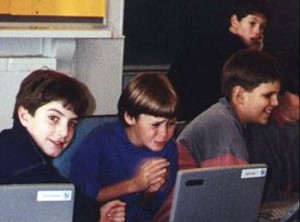“Young people have a remarkable capacity for intensity….”
Those words, uttered by one of America’s leading public intellectuals, Dr. Leon Botstein, President of Bard College, has driven my work for the past six or seven years. It is incumbent on every educator, parent, and citizen to build upon each kid’s capacity for intensity otherwise it manifests itself as boredom, misbehavior, ennui, or perhaps worst of all, wasted potential.
Schools need to raise the intensity level of their classrooms!
However, intensity is NOT the same as chaos. Schools don’t need any help with chaos. That they’ve cornered the market on.

Anyone who has seen me speak is familiar with this photograph (above). It was taken around 1992 or 1993 at Glamorgan (now Toorak) the primary school campus of Geolong Grammar school in Melbourne, Australia. The kids were using their laptops to program in LogoWriter, a predecessor to MicroWorlds or Scratch.
I love this photo because in the time that elapsed between hitting the space bar and awaiting the result to appear on the screen, every ounce of the kid’s being was mobilized in anticipation of the result. He was literally shaking,
Moments after that image was captured, something occurred that has been repeated innumerable times ever since. Almost without exception, when a kid I’m teaching demonstrates a magnificent fireball of intensity, a teacher takes me aside to whisper some variation of, “that kid isn’t really good at school.”
No kidding? Could that possibly be due to an intensity mismatch between the eager clever child and her classroom?
I enjoy the great privilege of working in classrooms PK-12 all over the world on a regular basis. This allows me observe patterns, identify trends, and form hypotheses like the one about a mismatch in intensity. The purpose of my work in classrooms is to model for teachers what’s possible. When they see through the eyes, hands, and sometimes screens of their students, they may gain fresh perspectives on how things need not be as they seem.
Over four days last month, I taught more than 500 kids I never met before to program in Turtle Art and MicroWorlds EX. I enter each classroom conveying a message of, “I’m Gary. We’ve got stuff to do.” I greet each kid with an open heart and belief in their competence, unencumbered by their cumulative file, IEP, social status, or popularity. In every single instance, kids became lost in their work often for several times longer than a standard class period, without direct instruction, or a single disciplinary incident. No shushing, yelling, time-outs, threats, rewards, or other behavioral management are needed. I have long maintained that classroom management techniques are only necessary if you feel compelled to manage a classroom.
In nearly every class I work with – anywhere, teachers take me aside to remark about how at least one kid shone brilliantly despite being a difficult or at-risk student. This no longer surprises me.
In one particular class, a kid quickly caught my eye due to his enthusiasm for programming. The kid took my two minute introduction to the programming language and set himself a challenge instantly. I then suggested a more complex variation. He followed with another idea before commandeering the computer on the teacher’s desk and connected to the projector in order to give an impromptu tutorial for classmates struggling with an elusive concept he observed while working on his own project. He was a fine teacher.
Then the fifth grader sat back down at his desk to continue his work. A colleague suggested that he write a program to draw concentric circles. A nifty bit of geometric and algebraic thinking followed. When I kicked things up a notch by writing my own even more complex program on the projected computer and named it, “Gary Defeats Derrick.” The kid laughed and read my program in an attempt to understand my use of global variables, conditionals, and iteration. Later in the day, the same kid chased me down the hall to tell me about what he had discovered since I left his classroom that morning.
Oh yeah, I later learned that the very same terrific kid is being drummed out of school for not being their type of student.
I learned long ago. If a school does not have bad children, it will make them.
Veteran educator Gary Stager, Ph.D. is the author of Twenty Things to Do with a Computer – Forward 50, co-author of Invent To Learn — Making, Tinkering, and Engineering in the Classroom, publisher at Constructing Modern Knowledge Press, and the founder of the Constructing Modern Knowledge summer institute. He led professional development in the world’s first 1:1 laptop schools thirty years ago and designed one of the oldest online graduate school programs. Gary is also the curator of The Seymour Papert archives at DailyPapert.com. Learn more about Gary here.
